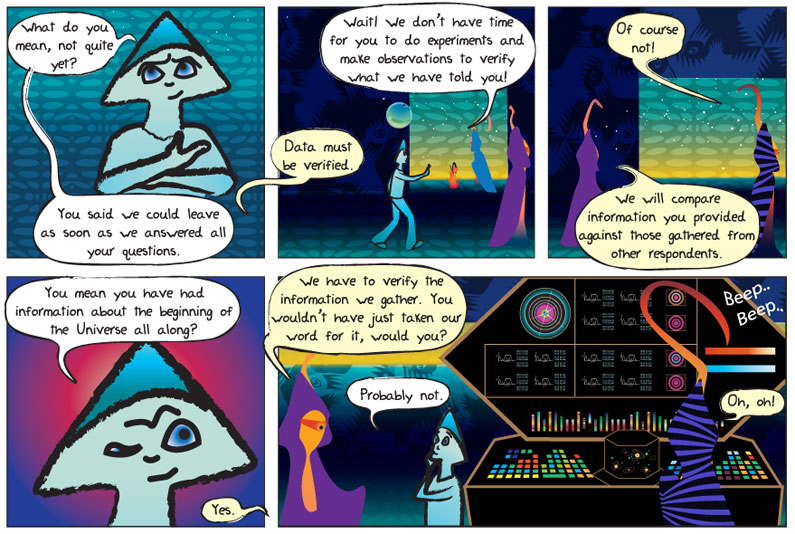
Panel 1
Alkina: What do you mean, not quite yet? You said we could leave as soon as we answered all your questions.
Panel 2
Worldship: Data must be verified.
Alkina: Wait! We don’t have time for you to do experiments and make observations to verify what we have told you!
Panel 3
Worldship: Of course not! We will compare information you provided against those gathered form other respondents.
Panel 4
Alkina: You mean you have had information about the beginning of the Universe all along?
Worldship: Yes.
Panel 5
Worldship: We have to verify the information we gather. You wouldn’t have just taken our word for it, would you?
Alkina: Probably not.
BEEP. BEEP.
Worldship: Uh, oh!
Is that all?
Why do scientists publish results of their work in scientific journals?
Hey, where’s my science?
A very important step in the scientific process is the verification of observations or data that are presented by someone. No matter how smart or famous a scientist is; if they make a scientific claim, it has to be verified by other scientists in order for it to be valid. It is not because scientists don’t trust each other. There are many reasons to verify other scientists’ assertions. The original investigator may have not accounted for all the variables that could have affected his or her conclusions. The original experiment or observation might conflict with another scientific theory, which must be reconciled. Some future experiment or observation might rely on the results of the current experiment or observation, and so on.
The aliens that Epo and Alkina have run into aren’t making their own observations or doing their own experiments about the origin of the Universe, but they are smart enough to verify the information that they collect, even if it comes from a highly reliable source like Epo and Alkina. Sometimes conducting one’s own experiments might not be possible because of costs or time involved. In these cases, comparing data from two different sources to make conclusions about a particular subject is also a valid way of testing a scientific theory.
For example, you might be asked to write a report on global climate change. You wouldn’t just use one source of information to write your paper, would you? We hope not. While you cannot be expected to do your own experiments for a simple school report, your teacher will expect you to research the subject thoroughly, which means collecting information from several different reliable sources to write your report.
